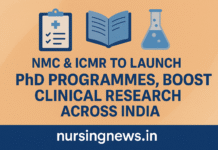Prime Minister Narendra Modi today marked the commencement of the 25th year of National Technology Day by inaugurating a special program in the national capital. The event, held from May 11 to May 14, aims to celebrate and showcase India’s technological advancements. During the ceremony, the Prime Minister also unveiled two significant facilities that will bolster the country’s capacity for cancer treatment and advanced medical imaging.
One of the key highlights of the event was the dedication of the ‘National Hadron Beam Therapy Facility’ and ‘Fission Molybdenum-99 Production Facility’ to the nation. These state-of-the-art facilities will play a crucial role in enhancing the country’s cancer treatment capabilities and advanced medical imaging techniques.
In addition, the Prime Minister laid the foundation stone for several cancer hospitals and facilities, which are set to decentralize and improve the provision of world-class cancer care across different regions of the country. This move aims to address the growing need for accessible and high-quality cancer treatment.
Among the projects dedicated to the nation are the Fission Molybdenum-99 Production Facility in Mumbai, the Rare Earth Permanent Magnet Plant in Visakhapatnam, the National Hadron Beam Therapy Facility in Navi Mumbai, the Radiological Research Unit in Navi Mumbai, the Homi Bhabha Cancer Hospital and Research Centre in Visakhapatnam, and the Women & Children Cancer Hospital Building in Navi Mumbai.
The Rare Earth Permanent Magnet Plant, situated at the Bhabha Atomic Research Centre campus in Visakhapatnam, is a significant achievement for India. This facility has been established using indigenous technology and resources, making India one of the few nations with the capacity to produce Rare Earth Permanent Magnets. Previously, these magnets were primarily produced by developed countries.
The National Hadron Beam Therapy Facility at Tata Memorial Centre in Navi Mumbai is a cutting-edge establishment designed to deliver highly precise radiation therapy to tumors while minimizing the impact on surrounding healthy tissues. This precision in delivering radiation significantly reduces the early and delayed side effects of the therapy, providing improved patient outcomes.
Located at the Trombay Campus of Bhabha Atomic Research Centre, the Fission Molybdenum-99 Production Facility holds immense significance in the field of medical imaging. Molybdenum-99, the parent isotope of Technetium-99m, is widely used in over 85% of imaging procedures for early detection of various conditions, including cancer and heart disease. With this facility in place, India expects to conduct approximately 9 to 10 lakh patient scans per year, addressing the growing demand for medical imaging in the country.
The inauguration of these advanced facilities and cancer hospitals reflects India’s commitment to advancing healthcare technology and providing accessible and high-quality care to its citizens. These initiatives hold great promise in improving cancer treatment outcomes and promoting early disease detection through advanced medical imaging techniques.
As the 25th year of National Technology Day kicks off, the nation anticipates further advancements in the field of healthcare technology and their positive impact on the well-being of the population.









